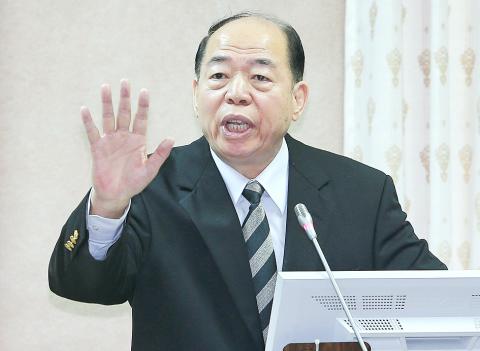The nation’s high-tech sector is under serious threat of industrial espionage as Chinese intelligence operatives target local companies for infiltration and collection of proprietary information, National Security Bureau (NSB) Director-General Yang Kuo-chiang (楊國強) told legislators yesterday.
Yang made the remarks during a question-and-answer session at a meeting of the legislature’s Foreign Affairs and National Defense Committee meeting.
New Power Party Legislator Freddy Lim (林昶佐) said he has grave concerns over Chinese espionage operations, because there have been numerous cases involving Chinese spies luring members of the nation’s armed forces into leaking classified military information.

Photo: CNA
“In addition to our military, which Taiwanese industries have been most seriously affected by Chinese spy infiltration?” Lim asked. “I would like to know, because I want these businesses to be alert to this danger so they can be more careful when hiring new workers.”
Yang said that the semiconductor and other tech sectors are the most likely targets.
Lim said that these sectors are key to the nation’s economy, and “yet President Ma Ying-jeou (馬英九) wants to open up the nation’s technology sector for investment by Chinese business. This is just absurd.”
Democratic Progressive Party (DPP) Legislator Wang Ting-yu (王定宇) said that Yang and the bureau should block bids by Chinese investors and companies to buy out Taiwanese tech businesses.
Wang was referring to the Investment Commission, which is tasked with the review, assessment and monitoring of foreign investment, and where the bureau has a representative seat.
He said the semiconductor sector is a pillar of the nation’s economy and the bureau should veto investment applications from China.
“Taiwan is a leader in IC design and we must not allow know-how and proprietary technology to be taken over by China. It is well-known that most large Chinese businesses are backed by financial capital from the Chinese government,” Wang said.
“So this is a national security issue and a serious threat to Taiwan’s economic development. Therefore, the NSB must not permit Chinese investment in the IC sector,” he added.
DPP Legislator Chiu Chih-wei (邱志偉) also asked Yang about the potential impact on cross-strait ties if China is not satisfied with president-elect Tsai Ing-wen’s (蔡英文) inauguration speech on May 20.
Yang said Beijing might shut down existing negotiation channels, prohibit Chinese tourists from visiting Taiwan, or take diplomatic action if it is unhappy with Tsai’s speech, Yang said.
The president would have to work with other senior government officials to make a response should China take any of the above three actions against Taiwan, Yang said.
Additional reporting by CNA

Conflict with Taiwan could leave China with “massive economic disruption, catastrophic military losses, significant social unrest, and devastating sanctions,” a US think tank said in a report released on Monday. The German Marshall Fund released a report titled If China Attacks Taiwan: The Consequences for China of “Minor Conflict” and “Major War” Scenarios. The report details the “massive” economic, military, social and international costs to China in the event of a minor conflict or major war with Taiwan, estimating that the Chinese People’s Liberation Army (PLA) could sustain losses of more than half of its active-duty ground forces, including 100,000 troops. Understanding Chinese

The Ministry of Foreign Affairs (MOFA) yesterday said it is closely monitoring developments in Venezuela, and would continue to cooperate with democratic allies and work together for regional and global security, stability, and prosperity. The remarks came after the US on Saturday launched a series of airstrikes in Venezuela and kidnapped Venezuelan President Nicolas Maduro, who was later flown to New York along with his wife. The pair face US charges related to drug trafficking and alleged cooperation with gangs designated as terrorist organizations. Maduro has denied the allegations. The ministry said that it is closely monitoring the political and economic situation

UNRELENTING: China attempted cyberattacks on Taiwan’s critical infrastructure 2.63 million times per day last year, up from 1.23 million in 2023, the NSB said China’s cyberarmy has long engaged in cyberattacks against Taiwan’s critical infrastructure, employing diverse and evolving tactics, the National Security Bureau (NSB) said yesterday, adding that cyberattacks on critical energy infrastructure last year increased 10-fold compared with the previous year. The NSB yesterday released a report titled Analysis on China’s Cyber Threats to Taiwan’s Critical Infrastructure in 2025, outlining the number of cyberattacks, major tactics and hacker groups. Taiwan’s national intelligence community identified a large number of cybersecurity incidents last year, the bureau said in a statement. China’s cyberarmy last year launched an average of 2.63 million intrusion attempts per day targeting Taiwan’s critical

AGING: As of last month, people aged 65 or older accounted for 20.06 percent of the total population and the number of couples who got married fell by 18,685 from 2024 Taiwan has surpassed South Korea as the country least willing to have children, with an annual crude birthrate of 4.62 per 1,000 people, Ministry of the Interior data showed yesterday. The nation was previously ranked the second-lowest country in terms of total fertility rate, or the average number of children a woman has in her lifetime. However, South Korea’s fertility rate began to recover from 2023, with total fertility rate rising from 0.72 and estimated to reach 0.82 to 0.85 by last year, and the crude birthrate projected at 6.7 per 1,000 people. Japan’s crude birthrate was projected to fall below six,